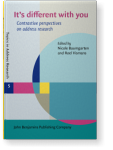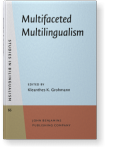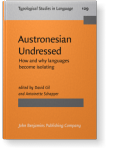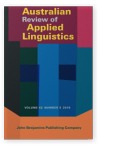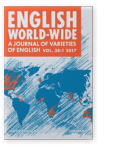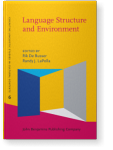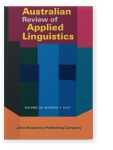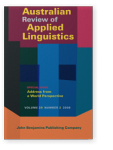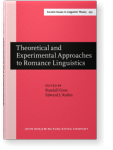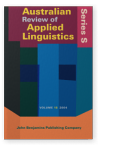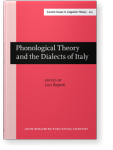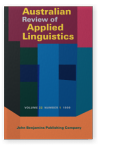John Hajek
List of John Benjamins publications for which John Hajek plays a role.
Book series
2024 Chapter 15. The sociolinguistics of urban multilingualism: Toronto and Melbourne Multifaceted Multilingualism, Grohmann, Kleanthes K. (ed.), pp. 395–413 | Chapter
Changing patterns of global migration and increasing ethnolinguistic (super)diversity hold sociolinguistic consequences for heritage/community languages (HCL) and majority languages in large urban centres. Studies in different cities have noted the existence of (multi-)ethnolects, which may… read more
2023 Chapter 10. Nominal address and introductions in three national varieties of German: Intralinguistic variation and pragmatic transfer to English It's different with you: Contrastive perspectives on address research, Baumgarten, Nicole and Roel Vismans (eds.), pp. 245–271 | Chapter
Using a large-scale survey, we explore reported nominal address and introduction routines in first encounters at international academic conferences. Our focus is on variation in such routines among respondents originating in Germany, Austria and Switzerland in their first language (L1) German… read more
2020 Chapter 8. Double agent, double cross? Or how a suffix changes nature in an isolating language: dór in Tetun Dili Austronesian Undressed: How and why languages become isolating, Gil, David and Antoinette Schapper (eds.), pp. 369–390 | Chapter
In East Timor, there have been centuries of contact between the strongly isolating Austronesian language Tetun Dili and the morphologically-rich Romance language Portuguese. In all this time, only one derivational morpheme has been borrowed into Tetun Dili for use with native lexicon. This is… read more
2019 Transition from V to T address among restaurant customers and waiters in Italy It’s not all about you: New perspectives on address research, Kluge, Bettina and María Irene Moyna (eds.), pp. 221–250 | Chapter
Drawing on a large-scale study on reported address practices in restaurant encounters in Italy, this chapter examines transition from formal V to informal T singular address pronouns in Italian, focusing on five geographically dispersed regions. Quantitative data suggest that the customer/waiter… read more
2019 Now you Sie me, now you don’t: The history and remnants of the 3pl V address pronoun calque in Slovak (onikanie) and in Czech (onikání) It’s not all about you: New perspectives on address research, Kluge, Bettina and María Irene Moyna (eds.), pp. 125–138 | Chapter
Among the neighbouring languages that calqued the third person plural (3pl) address pronoun Sie from German in the 18th century, the closely related languages Czech and Slovak offer contrasting diachronic and synchronic uses of their respective Sie-calques. In Czech, onikání (literally ‘addressing… read more
2019 Introductions at international academic conferences: Address and naming in three national varieties of English It’s not all about you: New perspectives on address research, Kluge, Bettina and María Irene Moyna (eds.), pp. 375–396 | Chapter
This chapter investigates preferred introduction routines in first encounters in the context of international academic conferences where English is used as the conference language. We focus on reported use of first and last names as well as titles in introductions in American, Australian and… read more
2019 Language programming in rural and regional Victoria: Making space for local viewpoints in policy development Australian Review of Applied Linguistics 42:3, pp. 274–300 | Article
Despite decades of often ambitious policies in Australia, languages education is still characterized by intermittent commitment to the teaching of languages, with inequitable access particularly entrenched in rural and regional contexts. While research has focused on the practical and material… read more
2017 Can you t[æ]ll I’m from M[æ]lbourne? An overview of the dress and trap vowels before /l/ as a regional accent marker in Australian English English World-Wide 38:1, pp. 29–49 | Article
This study gives an overview of the merger of the dress and trap vowels before laterals, which occurs for some speakers of Australian English in the state of Victoria (in the south-east of the country), as well as in some other varieties of English. Research on this phenomenon in Australian… read more
2016 Address practices in academic interactions in a pluricentric language: Australian English, American English, and British English Pragmatics 26:4, pp. 631–652 | Article
Following the recent development of address research in pluricentric languages (Clyne et al. 2006), the present study describes address practices in English-speaking academic settings and pursues two main objectives: (a) to provide a profile of address patterns in academic interactions in… read more
2015 Chapter 7. On the relation between linguistic and social factors in migrant language contact Language Structure and Environment: Social, cultural, and natural factors, De Busser, Rik and Randy J. LaPolla (eds.), pp. 149–176 | Article
With a rich migration history, the Australian context has provided a fascinating and fertile landscape through which to explore the patterns of linguistic and sociolinguistic variation which arise when languages and cultures are transplanted from earlier, often bilingual, environments to a new… read more
2007 Community languages and LOTE provision in Victorian primary schools: Mix or match? Australian Review of Applied Linguistics 30:1, pp. 7.1–7.22 | Article
Primary school languages education continues to be a challenging issue for all states in Australia. In Victoria, LOTE study is provided at the primary level to address the needs of linguistically diverse communities, as well as to provide an enriching learning experience for monolingual speakers of… read more
2006 Patterns of address in Dili Tetum, East Timor Address from a World Perspective, Kretzenbacher, Heinz L., Catrin Norrby and Jane Warren (eds.), pp. 21.1–21.18 | Article
This article focuses on a detailed description of patterns of address in Dili Tetum today. It outlines the complexities of the address system and points to considerable variation in its evolving presentday use. We find, amongst other things, that a speaker may use a range of address strategies even… read more
2005 Raddoppiamento sintattico (RS) and Word-medial Gemination in Italian: Are They The Same or Are They Different? The Evidence from Spontaneous Speech Theoretical and Experimental Approaches to Romance Linguistics: Selected papers from the 34th Linguistic Symposium on Romance Languages (LSRL), Salt Lake City, March 2004, Gess, Randall and Edward J. Rubin (eds.), pp. 257–271 | Article
2004 Keeping it all in the family: Tu, Lei and Voi. A study of address pronoun use in Italian Using and Learning Italian in Australia, Rubino, Antonia (ed.), pp. 97–114 | Article
Although the Italian system of address pronouns is relatively complex, scant attention is paid to the issue in L2 manuals designed for English-speaking learners of Italian. After showing that Italian L2 manuals are not necessarily accurate in the limited detail they provide, we examine… read more
2000 How Many Moras? Overlength and Maximal Moraicity in Italy Phonological Theory and the Dialects of Italy, Repetti, Lori (ed.), pp. 111–136 | Article
1999 Metalinguistic knowledge: How important is it in studying a language at university? Australian Review of Applied Linguistics 22:1, pp. 81–95 | Article
This paper reports on a project (funded by a small Australian Research Council grant) investigating levels of metalinguistic knowledge of English and other languages amongst first-year undergraduate learners of French, Chinese and Italian and the relationship between this knowledge and success in… read more
